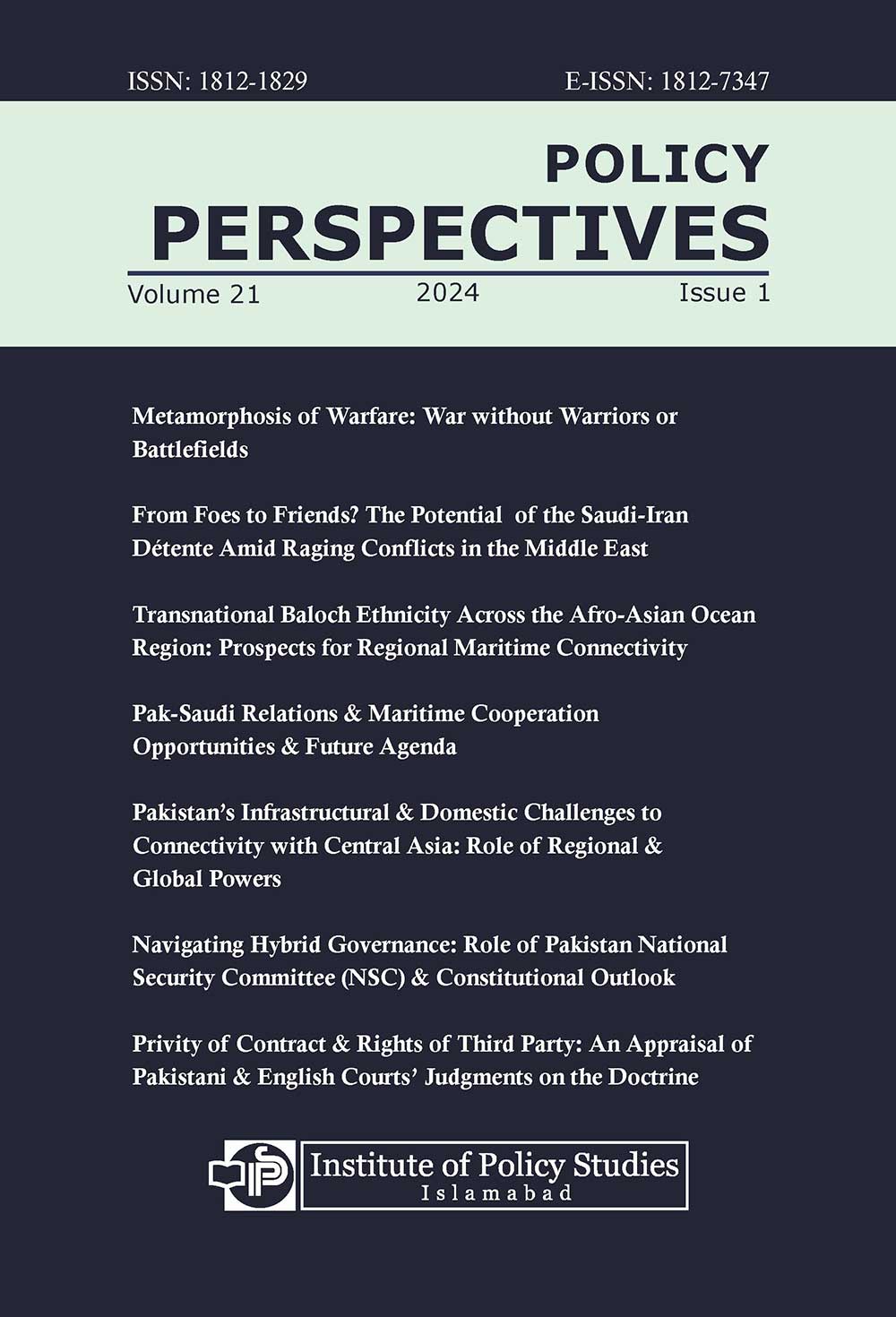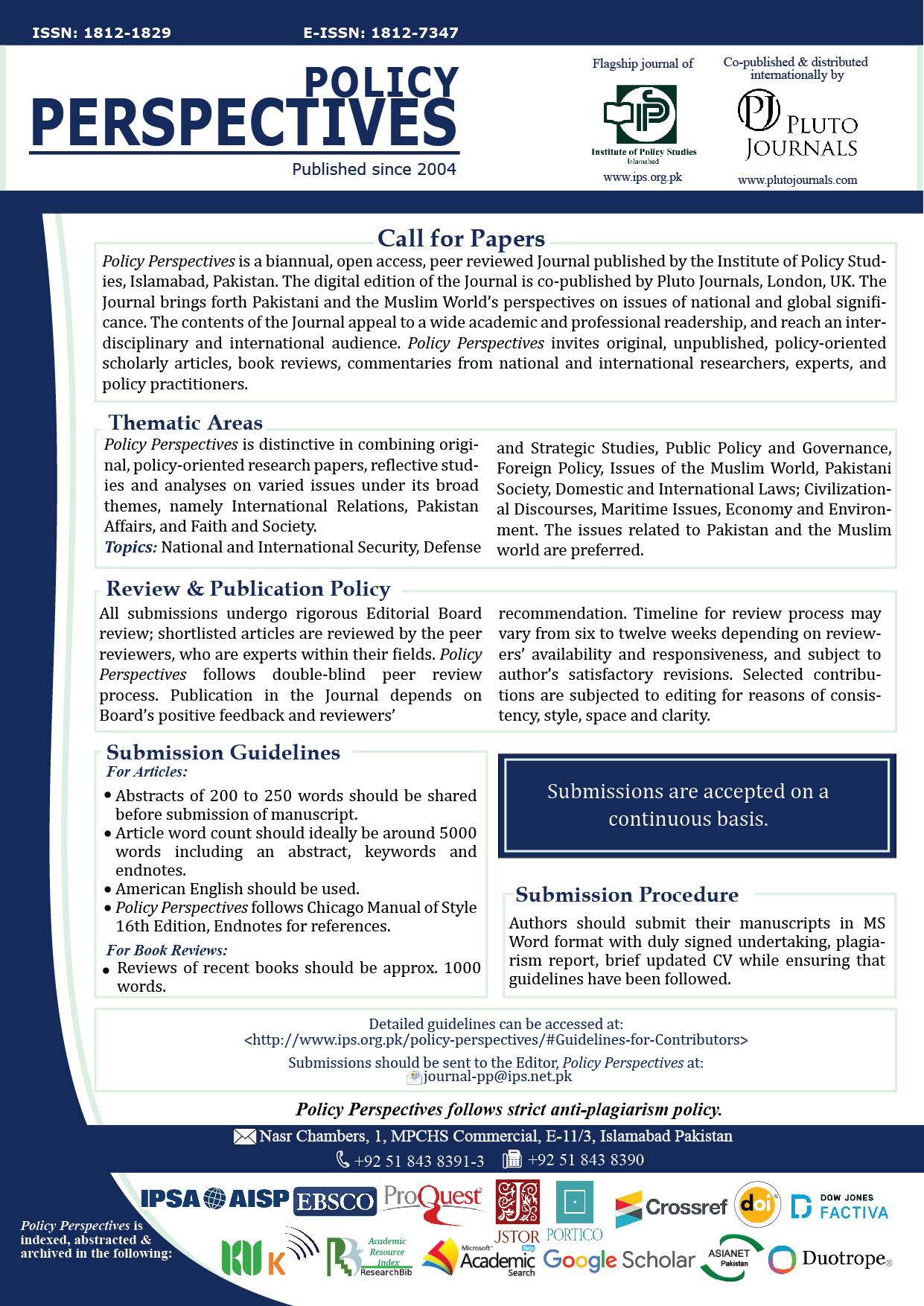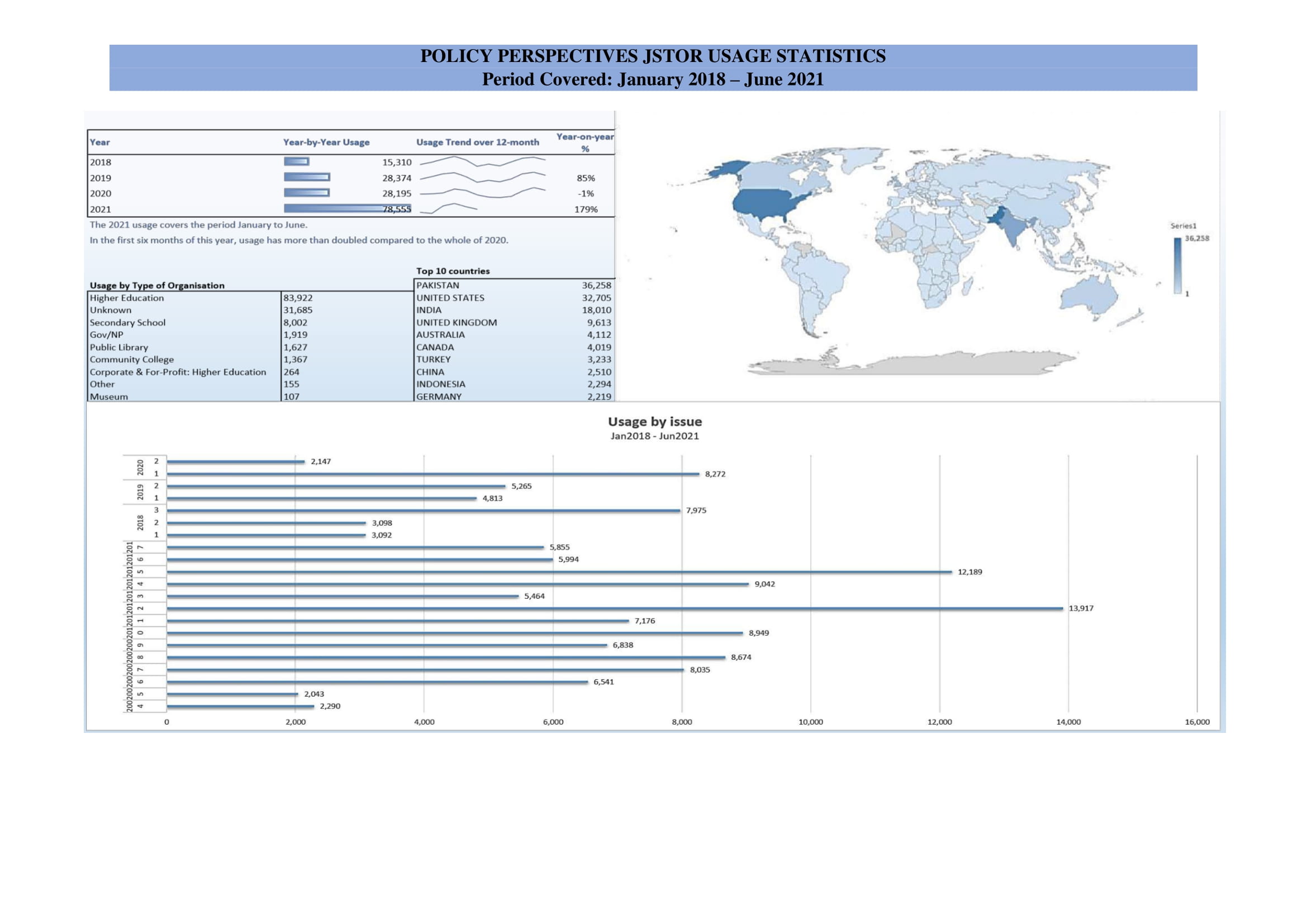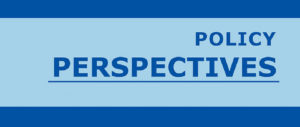ISSN: 1812-1829
E-ISSN: 1812-7347
Policy Perspectives is a peer-reviewed, open access, biannual journal of Institute of Policy Studies (IPS), Islamabad, which also brings forth occasional special issues. The journal disseminates the research carried out by the Institute and its associates on diverse range of current and evolving topics. The digital edition of the Journal is co published and distributed by Pluto Journals, UK.
Policy Perspectives is a peer-reviewed, open access, biannual journal with occasional special issues, published by Institute of Policy Studies (IPS) –an Islamabad-based think tank dedicated to promoting policy-oriented research and human development.
Established in 1979, the Institute defines Pakistan Affairs, International Relations and Faith and Society as its primary research areas, which are further divided into various sub-themes for focused studies.
The Institute’s research spanning over four decades has so far produced over 1500 seminars, conferences and roundtables, around 400 publications, and about 2500 research reports.
Policy Perspectives is the flagship journal of the Institute,disseminating the research carried out by IPS and its associates on diverse range of current and evolving topics. The journal reaches out to a large number of individual and institutional researchers, policy makers, key opinion leaders and other stakeholders within the country and across the globe, extending policy-oriented analysis, perspectives and recommendations on issues of national and global significance.
Policy Perspectives is distinctive in combining original research papers with reflective studies and analysis on varied themes and issues. Contributions to the journal appeal to a wide academic and professional readership, and reach an interdisciplinary and international audience. The Journal welcomes original, unpublished scholarly articles from research scholars, experts and policy practitioners. and accepts contributions in the thematic areas of international relations, Pakistan affairs, and faith and society in general, and the topics related to security, society, economy, strategy, governance and foreign policy in particular.
Editorial Board
Patron: Prof. Khurshid Ahmad Editor-in-Chief: Khalid Rahman Editor: Dr Atiq-uz-Zafar Associate Editors: Naufil Shahrukh, Syed Nadeem Farhat Assistant Editors: Zahida Khalid, Kulsoom Belal Editorial Assistant: Shafaq Sarfaraz
Editorial Advisory Board
Dr Zahid Hussain Bukhari, Executive Director, Center for Islam and Public Policy (CIPP), Washington, DC, USA; Former Director, American Muslim Studies Program (ASMP), Prince Alwaleed Center for Muslim-Christian understanding, Georgetown University, Washington DC, USA. Dr Muhammad Umer Chapra, Advisor, Islamic Research and Training Institute (IRTI), Islamic Development Bank (IDB), Jeddah, Saudi Arabia. Dr Akis Kalaitzidis, Professor, International Relations and Comparative Politics, School of Social Science and Languages, College of Arts Humanities and Social Sciences University of Central Missouri, Warrensburg, USA. Dr Robert Jensen, Professor Emeritus, School of Journalism, Moody College of Communication, University of Texas, Austin, USA. Prof. Roger van Zwanenberg, Managing Director, Pluto Journals, London, UK. Dr Aisha Ahmad , Assistant Professor, Department of Political Science Centre for South Asian Studies, The Asian Institute and Co-Director of the Islam and Global Affairs Initiative at the Munk School of Global Affairs and Public Policy, University of Toronto, Toronto, Canada. Dr Shahram Akbarzadeh, Research Professor, Middle East & Central Asian Politics, Faculty of Arts and Education, Alfred Deakin Institute, Deakin University, Melbourne Burwood Campus, Melbourne, Australia. Dr Torkel Brekke, Professor of History of Religions, Department of Culture Studies and Oriental Languages, University of Oslo, Oslo, Norway. Dr. Wang Xu, Associate Professor, Department of South Asian Studies, School of Foreign Languages, Peking University, Beijing, China. Dr Ivan Safranchuk, Senior Research Fellow, Centre of Central Asia and Afghanistan of the Institute for International Studies, Moscow State Institute of International Relations (MGIMO) University, Moscow, Russia.
Policy Perspectives is indexed/abstracted in the following:
- Directory of Open Access Journals (DOAJ)
- ProQuest
- EBSCO
- Factiva
- Ovid
- ResearchBib
- JSTOR
- Portico
- Crossref
- Google Scholar
- Duotrope
- Journament
- Asianet Pakistan
 |
 |
 |
 |
 |
 |
 |
 |
 |
 |
 |
 |
 |
 |
||
Last updated on 22 March 2023
Call for Papers
Policy Perspectives is a biannual, open access, peer reviewed Journal published by the Institute of Policy Studies, Islamabad, Pakistan. The digital edition of the Journal is co-published by Pluto Journals, London, UK. The Journal brings forth Pakistani and the Muslim World’s perspectives on issues of national and global significance. The contents of the Journal appeal to a wide academic and professional readership, and reach an interdisciplinary and international audience.
Policy Perspectives invites original, unpublished, policy-oriented scholarly articles, book reviews, commentaries from national and international researchers, experts, and policy practitioners.
Thematic Areas
Policy Perspectives is distinctive in combining original, policy-oriented research papers, reflective studies and analyses on varied issues under its broad themes, namely International Relations, Pakistan Affairs, and Faith and Society.
Topics:
National and International Security, Defense and Strategic Studies, Public Policy and Governance, Foreign Policy, Issues of the Muslim World, Pakistani Society, Domestic and International Laws; Civilizational Discourses, Maritime Issues, Economy and Environment. The issues related to Pakistan and the Muslim world are preferred.
Peer Review & Publication Policy
All submissions undergo rigorous Editorial Board review; shortlisted articles are reviewed by the peer reviewers, who are experts within their fields. Policy Perspectives follows double-blind peer review process. Publication in the Journal depends on Board’s positive feedback and reviewers’ recommendation. Timeline for review process may vary from six to twelve weeks depending on reviewers’ availability and responsiveness, and subject to author’s satisfactory revisions. Selected contributions are subjected to editing for reasons of consistency, style, space and clarity.
Submissions are accepted on a continuous basis.
Submission Guidelines
For Articles:
- Abstracts of 200 to 250 words should be shared before submission of manuscript.
- Manuscripts should be in MS Word format.
- Article word count should ideally be around 5000 words including an abstract, key words and endnotes.
- American English should be used.
- Policy Perspectives follows Chicago Manual of Style 16th Edition, Endnotes for references. (For examples, please see detailed guidelines.)
Detailed guidelines can be accessed at:
http://www.ips.org.pk/policy-perspectives/#Guidelines-for-Contributors
For Book Reviews:
- Book Reviews of recent books should be approx. 1000 words.
Submission Procedure:
Authors should submit their manuscripts with duly signed undertaking, plagiarism report, brief updated CV while ensuring that guidelines have been followed at the following address:
Email: journal-pp@ips.net.pk
Postal Address: Nasr Chambers, 1, MPCHS Commercial, E-11/3, Islamabad Pakistan
Tel: +92 51 843 8391-3; +92 51 843 8390

Note: Policy Perspectives follows strict anti-plagiarism policy.
Guidelines for Contributors
The Policy Perspectives welcomes original, unpublished, policy-oriented scholarly manuscripts from research scholars, experts and policy practitioners based in Pakistan and other parts of the world. The journal reaches out to a large number of individual and institutional researchers, policymakers, key opinion leaders and other stakeholders within the country and across the globe, extending policy-oriented analysis, perspectives and recommendations on issues of national and global significance.
Submissions should be made using our digital submission system while ensuring that guidelines have been followed. All submissions are screened by the Editorial Board review; shortlisted articles undergo double-blind peer reviews. Publication in the Journal depends on Board’s positive feedback and reviewers’ recommendation.
Submission Process
To submit a manuscript for consideration for publication in the Policy Perspectives click on the “Submit a Manuscript” button on ScienceOpen in the header of the journal landing page. For details, please see guidelines for online submissions.
Word Count: Abstract should be of no more than 150 words, with 5-6 keywords. Total word count of the article should be ideally around 5000 words.
Book Reviews of latest books of around 1000 words can also be submitted.
Submission Timeline
- Upon submitting an article, author/s will receive an acknowledgement of its receipt. After plagiarism check, the article will be evaluated by the Editorial Board for its suitability for the Journal. If selected, it will be sent to two subject experts for double-blind peer review. This process will take three to four months approximately. Timelines of review process may vary depending on reviewer’s availability and responsiveness.
- Reviewers may suggest major or minor revisions, or reject the manuscript for publication. After Editorial Board has made a decision based on reviewers’ recommendations, author/s will be informed.
- In case of major or minor revisions, reviewers’ feedback will be shared with authors. Authors will be required to incorporate the feedback in two to three weeks for reviewer/s to take a second look.
- While resubmitting, author/s should include the revised article in Track Mode along with their responses for the reviewer/s stating how their comments have been incorporated.
- Upon receiving the revised draft, it will be shared with reviewers to see if they are satisfied with the revisions. Due to reviewers’ busy schedule, this process may take one to two months. Final decision will be communicated to author/s.
- If the manuscript has been approved for publication, it will be included in the next issue. Since Policy Perspectives occasionally publishes special issues, approved article may not be published in the earliest issue. Nonetheless, the author/s will be informed and updated at each stage. Although the editorial team aims to expedite the whole process, it can still take up to a year or less between the original submission deadline and final publication.
Spelling and Style Guide
Spellings and punctuation should be used where they are optional in American English (e.g. organize, center, defense). Commas and periods should be given inside closing quotation marks. Single quotation marks are to be used throughout. Longer quotations should be indented and set off from the text, and given in smaller font size, without quotation marks.
Dates should be written as May 20, 2020. Abbreviations should be given in brackets after giving the full form on first use, e.g., United Nations (UN). Subsequently, UN should be used throughout the text.
References
Chicago Manual of Style (CMOS) 16th Edition should be followed for endnotes. Main words in the titles of articles, books and journals should begin with capital letters. Titles of Books, Journals, Newspapers should be italicized. Reports should be cited like books. In case of multiple authors, give the names of all the authors in the endnotes. Examples of citations in CMOS16 are given below:
Books: Syed Irtiqa Ahmed Zaidi, Negotiating the Power Corridors: Forty Challenging Years of Civil Service (Islamabad: IPS Press, 2020).
Chapters in books: Ye Hailin, “Rise of Extremism in India and Chinese Response,” Hindutva: Rising Extremism in India, ed. Khalid Rahman, 2nd ed. (Islamabad: IPS Press, 2020), 117.
Journal articles: Asma Sana Bilal and Nabiya Imran, “Emerging Contours of Transatlantic Relationship under Trump Administration,” Policy Perspectives 16, no. 1 (2019): 3-21 (7) https://doi.org/10.13169/polipers.16.1.0003.
Newspaper articles/websites: Waqar Masood Khan, “Unified Economic Response,” Express Tribune, April 1, 2020, accessed May 12, 2020, https://www.thenews.com.pk/print/637477-.
Diagrams and Tables
Tables, charts, graphs, and figures may be included in the manuscript where necessary with consecutive numbering, proper captions and complete references. These should be in an editable form. Images should be submitted in high resolution (300-600 dpi) in .jpeg and .bitmap. Responsibility to seek permission to reproduce illustrations subject to copyright lies with the author/s.
Copyright
This journal is published under the Creative Commons License CC BY 4.0. This license allows users, scholars and readers, to read the content or any part of the content without charges. This license allows scholars to download and use the contents for educational purposes. This license does not allow the content or any part of the content to be used for commercial purposes.
Submission/Publication Charges
There is no submission fee or publication charges.
“Is the European Union Evolving or Failing?”
Brief Summary Najimdeen Bakare and Tatheer Zahra Sherazi Volume 16, Issue no. 2, Policy Perspectives (2019): 5-25. https://doi.org/10.13169/polipers.16.2.0005 Abstract In recent years, the European Union (EU) has seen and grappled with a varied degree of crisis, which a few observers considered as proof of its vulnerability and at worst scenario – existential threat. As it is with every crisis, there are gainers and losers; there are those who benefit from the fallout and others who manage to turn vulnerability into opportunity and strength. The crisis surrounding the EU can be characterized along the latter context, particularly in the backdrop of rising European populism. The rise of contemporary European populism has raised many questions and generated debates. Based on its anti-EU rhetoric and growing public acceptability, populism is interpreted as EU’s political nemesis. In the midst of rising European populism, the paper looks at the debates in which the EU is considered as a failing or failed project. It also explores the extent to which European populism impacts the European political landscape. The paper explores the notion of populism as an anti-EU movement, bent at dislodging and disintegrating the Union. It argues that the actions of the populist parties suggest otherwise; populist dramatization underscores EU’s continuous evolution and transition instead of its disintegration. Keywords Populism, EU in Transition, EU’s Demise, EU Legitimacy, EU-Exit, Brexit.
“Citizenship Laws of Pakistan: A Critical Review”
Brief Summary Syed Nadeem Farhat Volume 16, Issue no. 2, Policy Perspectives (2019): 59-85 https://doi.org/10.13169/polipers.16.2.0059 Abstract Citizenship is considered a fundamental right that guarantees every other right. Citizenship law of Pakistan was enacted in 1951 and took care of the situations that could presumably arise with respect to this right. The changes in geography, technology and demography as well as the evolution of international law on citizenship during almost seven decades have created certain gaps that may have implications for individuals and their rights might be at stake. Varying interpretations of the courts on certain dimensions of law as well as the failure to introduce the modifications suggested by superior judiciary are among the factors that cause concerns. Along with the Citizenship Act and the law for naturalization, the treatment of foreigners in the country too has certain serious shortcomings that may have severe implications. This paper focuses more on the statutes and their current interpretation. It underscores the significance of the right to citizenship and analyzes various scenarios for acquisition of citizenship, its loss, the status of foreigners and judgements under Pakistani citizenship laws. Keywords Citizenship, Nationality, Migration, Jus Soli, Irregular Immigration.
“Fatwa Institution and Product Development for Islamic Finance in Pakistan”
Brief Summary Ghazala Ghalib Khan and Atiq-uz-Zafar Volume 16, Issue no. 2, Policy Perspectives (2019): 107-126. https://doi.org/10.13169/polipers.16.2.0107 Abstract Pakistan, being an Islamic Republic, is constitutionally obliged to eliminate ribā (interest) from its economy. Thus, Islamic Finance (IF) industry was introduced as an alternate to conventional ribā-based system of financial intermediation. However, efforts towards innovative system of IF are not devoid of criticism. Thus, institutions offering IF, are denounced for excessive reliance on stratagems to legalize ribā, misuse of plurality in Islamic legal rules and gross misapplication of the principles of Islamic Law. The pivotal task of determining sharīʻah compatibility of products and services is realized through the institution of fatwa. Hence, the given scenario of industry stipulates critical appraisal of role and protocols of this very institution for product development (PD). This article argues that for consistency of Islamic financial intermediation with sharīʻah, the industry needs to standardize ‘product development procedures’ with greater focus on regulating its fatwa institution. Keywords Fatwa, Islamic Finance, Product Development, Sharīʻah, Ribā.
|
Download Contents |
Policy Perspectives (Volume 21, Issue No. 1, 2024)
The latest issue of Policy Perspectives presents research, analyses and discussion on various topics concerning national, and international issues from policy experts, academics, and practitioners.
The first paper on ‘Metamorphosis of Warfare: War without Warriors or Battlefields’ discusses the evolution of warfare from first to fifth generation. It explores the latest trends in land and air warfare, analyzing the hybrid and ‘Everywhere Battlefield’, which though marks technical superiority, points to a decline in respect for human integrity and values.
Author: Aneela Shahzad, Geopolitical Analyst; Author of the following books: Understanding Geopolitics; and Geopolitics-from the Other Side.
DOI: https://doi.org/10.13169/polipers.21.1.ra1
Dr Nora Maher in her paper ‘From Foes to Friends? The Potential of the Saudi-Iran Détente Amid Raging Conflicts in the Middle East’ reviews the Saudi-Iran deal brokered by China in March 2023, which represents the thawing of frosty bilateral relations between Riyadh and Tehran after prolonged antagonism and an unending series of proxy wars. She evaluates the potential of the historic deal by assessing the strategic realignment of both countries, focusing on the prospects for both sides.
Author: Dr Nora Maher, Political Science, Faculty of Economics and Political Science, Cairo University, Cairo, Egypt; Former Associate Professor, Political Science, The British University in Egypt (BUE), Cairo, Egypt.
DOI: https://doi.org/10.13169/polipers.21.1.ra2
The next paper ‘Transnational Baloch Ethnicity Across the Afro-Asian Ocean Region: Prospects for Regional Maritime Connectivity’ maps the transnational ethnic identity of the Balochs. The predominantly ethnic Balochs from the coastal belt of Balochistan and Sindh have, over the centuries, spread across the littoral regions of the Indian Ocean, particularly in Gujarat, South India, the Persian Gulf, as well as East Africa. It underscores opportunities for Pakistan to tap into the hidden potential of ethnic and social linkages, fostering public diplomacy and geoeconomic connectivity in the Afro-Asian Ocean region.
Author: Naufil Shahrukh, Former General Manager, Institute of Policy Studies (IPS); Deputy Team Leader, Institutional Reform Studies, Karachi Water Sewerage Services Improvement Project (KWSSIP), an initiative of the Government of Sindh funded by the World Bank and Asian Infrastructure Development Bank (AIDB); PhD Scholar, Department of History, Quaid-i-Azam University, Islamabad, Pakistan.
DOI: https://doi.org/10.13169/polipers.21.1.ra3
The next paper on ‘Pak-Saudi Relations Maritime Cooperation: Opportunities Future Agenda’ highlights the potential benefits of Pakistan’s relations with Saudi Arabia, consequent trade partnerships, investment prospects, technological advancements, and regional cooperation on the former’s economy. In the wake of Saudi Arabia’s Vision 2030 and significant investments in its maritime and logistics sectors, Pakistan, too, can capitalize on strengthened maritime collaboration with Saudi Arabia, with its strategically important ports such as Gwadar and Karachi ports.
Author: Muhammad Jawad Akhtar, Former Advisor, Ministry of Planning, Development Special Initiatives (MoPDSI), Government of Pakistan; Senior Associate, Institute of Policy Studies (IPS), Islamabad, Pakistan.
DOI: https://doi.org/10.13169/polipers.21.1.ra4
Given its geostrategic location, Pakistan is often called a gateway to the Central Asian Republics (CARs). Its significance has further increased with the China-Pakistan Economic Corridor (CPEC), which holds a pivotal role in the region. However, regional connectivity faces numerous challenges, including political, geographical, economic, infrastructural problems. Dr Faisal Javed, Dr Uzma Siraj, and Dr Arkadiusz Zukowski in their paper ‘Pakistan’s Infrastructural Domestic Challenges to Connectivity with Central Asia: Role of Regional Global Powers’ provide a nuanced understanding of the potential barriers to regional connectivity and the efforts required to overcome them.
Author: Dr Faisal Javed, Assistant Professor, Department of International Relations, Federal Urdu University of Arts, Sciences and Technology, Karachi, Pakistan; Dr Uzma Siraj, Assistant Professor, Department of International Relations, Federal Urdu University of Arts, Sciences and Technology, Islamabad, Pakistan; and Dr Arkadiusz Zukowski, Professor, Institute of Political Science, University of Warmia and Mazury in Olsztyn, Olsztyn, Poland.
DOI: https://doi.org/10.13169/polipers.21.1.ra5
The paper ‘Navigating Hybrid Governance: Role of Pakistan National Security Committee (NSC) Constitutional Outlook’ analyzes the civil-military relations in Pakistan under two different models i.e., ‘control theory’ and ‘convergence theory’ to bring in a new perspective to the analysis of the topic. It looks into the case of hybrid governance under the NSC in line with the tenets of the 1973 Constitution of Pakistan. It suggests that a consistently functional consultative NSC can help diffuse the ideological differences between civil and military leadership, creating synergies.
Author: Anum Akhlaq, Researcher at the Institute of Policy Studies (IPS), Islamabad, Pakistan; MS scholar, Media Studies, Riphah International University, Islamabad, Pakistan.
DOI: https://doi.org/10.13169/polipers.21.1.ra6
Farqaleet Khokhar in his paper on ‘Privity of Contract Rights of Third Party: An Appraisal of Pakistani English Courts’ Judgments on the Doctrine’ comparatively surveys the two limbs of the privity doctrine. To critically analyze the developed jurisprudence on the doctrine, he reviews the judgments of Pakistani and English courts. He further evaluates the traditional approach of Pakistani courts toward the non-enforcement of third-party rights. Khokhar underscores the significance of evolved English approach which gives the third parties the right to enforce a contract, which confers benefits on them.
Author: Corporate Lawyer; LLB (Hons), Gillani Law College, Bahauddin Zakariya University, Multan, Pakistan.
DOI: https://doi.org/10.13169/polipers.21.1.ra7
Finally, the ‘Dialogue at IPS’ section features ‘18th Lok Sabha Elections in India: Approaches Emerging Trends’ based on the discussions on the topic held at the Institute of Policy Studies during recent months.
The full text of the articles will be available soon at ScienceOpen and JSTOR.
Annual Subscription PKR1000 Price (Per Issue) PKR600. Overseas USD120 including bank charges. To subscribe, contact: Saeed Gohar Subscription Manager publications@ips.net.pk +(92)-51-8438388
Editorial Office: journal-pp@ips.net.pk




